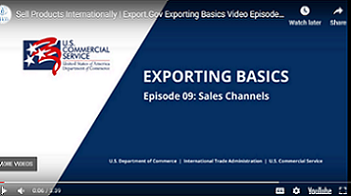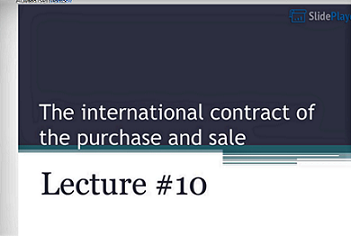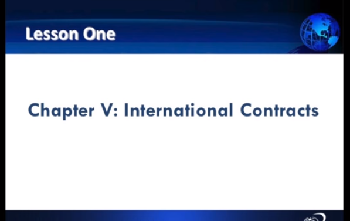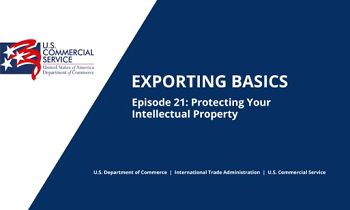Legal
There are many legal considerations when entering international markets. This section provides some resources when deciding who you should partner with, how you will write your contract, and how best to protect your property and business. This section is meant to be informative, but is not meant as legal advice. Please contact an attorney with experience in contract law before entering into any contract.
Which type of International partner is best for you?
I want to read about it
Sales Agent
- Sales agents represent your product, make sales, passes the sale on to you, and are paid by commission.
- You are responsible invoices the customer, receiving payment, shipping, export and import compliance, and service of the product, if needed.
- Sales agents do not take legal title of the product and do not have a supply of the product, so shipment time may be slow.
- They often are a one-person operation, and may not have large resources for marketing campaigns, relying more on in-person sales calls.
- However, you will have greater control of the end user of your product and will be able to cultivate a long-term, direct relationship with your customer.
Distributor
- Distributors purchase your good, take title, inventory these in-country, and sale and distribute your product – you just have one customer to deal with.
- They can provide in-country customer service and training and often have larger budgets for marketing campaigns than sales agents.
- Shipping times are generally quick to the end user and they often have advanced logistical systems in place.However, you do not have control over the selling price of your product, unless discussed and added to your contract from the start or at set renewal dates.
- Distributors also do not share their sales data with you, so you do not know exactly who is purchasing your product.
Export Management Companies
- EMC’s act as your own international department. They take care of marketing, sales, shipments, and product support. They often focus on specific industries but do not carry competing products.
- However, EMC’s have control over your sales and marketing decisions. They may lower your profits as they often ask for greatly discounted pricing. Some EMC’s charge a monthly retainer to carry and sell your product, at least in the early stages of your partnership.
How to find your international partner?
- Networking – Ask peers in your industry who they use and if they are aware of other partners that may have reached out to them.
- Trade shows – International partners often attend trade shows to try to connect to producers. This is a great place to make contact and consider a relationship.
- Follow-up – International partners may reach out to you. Perform credit checks, reference checks, and ask for a list of clients they work with to see if they may be a good fit.
- Industry Associations – National or international industry associations may maintain a list of partners people have used.
Questions to ask partners when vetting
- What is the company's history and what are the qualifications and backgrounds of the principal officers?
- Does the company have adequate trained personnel, facilities, resources to devote to your business?
- What is their current sales volume?
- What is the size of their inventory?
- How will they market your product (retail, wholesale or direct)?
- Which territories or areas of the country do they cover?
- Do they have other U.S. or foreign clients? Are any of these clients your competitors? (It is important to obtain references from several current clients.)
- What types of customers do they serve?
- Do they publish a catalogue?
- What is the size of their sales force?
I want to watch a video about it
I want to talk to a person about it
Contracts
I want to read about it
Note: The following section is meant for your information only. Our office strongly recommends using an attorney with international experience before entering into a contract with a foreign entity.
This is a general checklist to consider when writing a contract with an overseas partner:
General
- Clear introduction of all parties of the contract
- Territory – can be defined geographically, market segment, specific distribution channels, or specific customer lists
- Description of one or more product lines
- Exclusivity and restriction of sale of similar or competitive products
- Rights of the exporter in the defined territory
- Country of jurisdiction and governing law
- Contract language for contract to be written in
- Ownership of all intellectual property
- Duration of the contract with extension provision
- Delivery and shipping terms – see INCO terms for more information
- Method and terms of payment
- Transfer title of goods
- Payment policy regarding commissions and payments
- Currency of payments and currency fluctuation clause
Duties of the Exporter
- Define the level of product quality and accompanying service support
- Marketing materials – who will produce and pay the costs
- Delivery performance commitment
- Warranty, maintenance, and liability duties
Duties of Distributor of Sales Agent
- Clause defining the limited capabilities of the overseas partner, as a representative, not a legal agent
- Exclusivity from competitive products
- Level of service required
- Performance clauses
- Inventory requirements
- Compliance with all US laws and Export Administration regulation
- Marketing responsibilities
- Repair, maintenance, and warranty responsibilities
- Training requirements
- Reporting obligations
- Process of new product introduction
Termination
- Grounds for termination
- Dispute settlement clause and country of jurisdiction
- Length of notice required for termination
- Consequence of termination
- Escape clauses for each party
Tips
- Watch for contract clauses that name the other party only as an independent contractor. This may void legal protections.
- Be cautious of distributor exclusivity. Your distributor may carry similar products from another company and want to lock-out your product from being sold in the market.
Resources
- Country Commercial Guides - These guides outline how to do business in specific foreign countries and have information about legal requirements.
I want to watch a video about it
International Contracts- overview of major contract sections
International Contracts- from Holt and Sons International. This 39-minute video is long but full of great information.
I want to talk to a person about it
Intellectual Property
I want to read about it
Four types of Intellectual Property
Patents
- Patents are property rights applied to inventions.
- International Patents do not exist. You need to file patent applications in each country you do business in to be protected. However, you can file an application for the Patent Cooperation Treaty with the World Intellectual Property Organization. This is allows you to seek patent protection in the 143 partnering countries simultaneously.
- Contact the regional US Patent in Denver. They can provide free information to get you started and save you money.
Trade Secrets
- Trade secrets are practices, designs, formulas, processes, recipes, or ideas companies have developed and used in their industry. These are not protected by governments but are kept secure by one’s own company. The American Bar Association has a list of best practices for this.
Trade Marks
- Trademarks are words, phrases, symbols, logos, or designs used by your company to distinguish it from other companies.
- Trademark protection is important and needs to be done in countries you are doing business in. The US Patent and Trademark Office can help you submit an application relating to the Madrid Protocol, which allows filing for trademark protection in 102 countries simultaneously. Visit their FAQ page here for more information.
Copyrights
- Copyrights protect original authors of published and unpublished material. You should make sure you register your material with the US Copyright Office.
- Copyright law is governed by individual countries. However, the Berne Convention gives protection to authors of the 176 member states the same protection they are afforded in their home country. This sounds good, but could mean you might have to go to court in a foreign country, in a foreign language, to dispute the use of your material.
- To protect your copyright material international, make use to register your material in the USA.
Resources
- World Intellectual Property Organization
- US Patent Office – Denver Regional Office
- Intellectual Property Enforcement – US Department of State
I want to watch a video about it
I want to talk to a person about it




